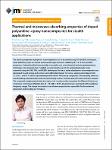Item Infomation
Full metadata record
| DC Field | Value | Language |
|---|---|---|
| dc.contributor.author | Pratap, Vivek | - |
| dc.contributor.author | Hussain, Aasim | - |
| dc.contributor.author | Katiyar, Rajesh | - |
| dc.date.accessioned | 2023-08-25T07:04:51Z | - |
| dc.date.available | 2023-08-25T07:04:51Z | - |
| dc.date.issued | 2023 | - |
| dc.identifier.uri | https://link.springer.com/article/10.1557/s43578-023-01125-3 | - |
| dc.identifier.uri | https://dlib.phenikaa-uni.edu.vn/handle/PNK/8950 | - |
| dc.description | CC-BY | vi |
| dc.description.abstract | The thermal properties of polymeric nanocomposites can be examined using TGA and DSC techniques, while dielectric properties can be examined through simulated scattering (S11, S12, S21, and S22) parameters. Polyaniline (PAni) nanopowder was synthesized using chemical oxidative polymerization techniques. Consequently, the crystallite size and morphology of the synthesized powder were examined using the XRD, TEM, and FESEM techniques. Further, a series of polymeric nanocomposites was developed via wet mixing and compressor molding techniques for various volume percentages (54.0, 57.5, 60.1, and 61.7 vol%) of synthesized powder within PAni/epoxy composites. Consequently, dielectric and absorbing properties have been measured using a vector network analyzer and its software module. The computed complex permittivity data were used to evaluate the absorption for different thicknesses of samples. | vi |
| dc.language.iso | en | vi |
| dc.publisher | Springer | vi |
| dc.subject | microwave-absorbing properties | vi |
| dc.subject | stealth applications | vi |
| dc.title | Thermal and microwave-absorbing properties of doped polyaniline–epoxy nanocomposites for stealth applications | vi |
| dc.type | Book | vi |
| Appears in Collections | ||
| OER - Khoa học Vật liệu, Ứng dụng | ||
Files in This Item:

